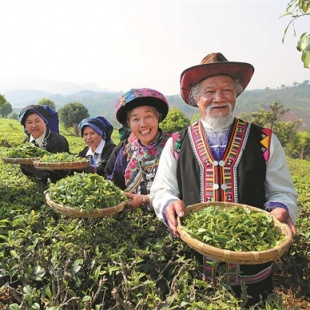Cherishing the gifts of ancestors
Ancient tea trees are central to livelihoods and traditions of ethnic groups living in Yunnan province's Jingmai Mountain, Deng Zhangyu reports.


The ancient tea tree plantations on Jingmai Mountain cover about 16,000 hectares. The tea trees are all over 100 years old, with some aged more than 1,000.
"We advocate for all living creatures in the area to be protected. We believe each has its own spirit, so we should treat them like humans," says Nan, 61, at his tea house in Mangjing village.
While he is speaking, a bee flies into his house and cannot escape, trapped by a glass door. Nan walks slowly toward it, covers it with a cup and takes it outside to free it. "We see all the insects, birds and other animals as our tea gardens' guards. We also protect them and live with them in harmony," says Nan.
Each tea tree in Nan's garden, which is about the size of seven soccer fields, is like his baby. He knows them well and prefers to harvest the oldest ones himself, in case others who are not familiar with them break the branches during picking.
Nan says the average income for a person working only in the picking season (two months in spring and two in autumn) can reach 40,000 yuan ($5,800), sufficient for a good life there.
"We are not short of land, money or houses. We are in need of educated young people who can help us to better protect our environment and keep our promises to our ancestors," says Nan.
Xian Jin is one such young person, who returned to her village in Jingmai Mountain after studying tea culture and art in cities like Shenzhen in Guangdong province and Kunming, the capital of Yunnan.





































